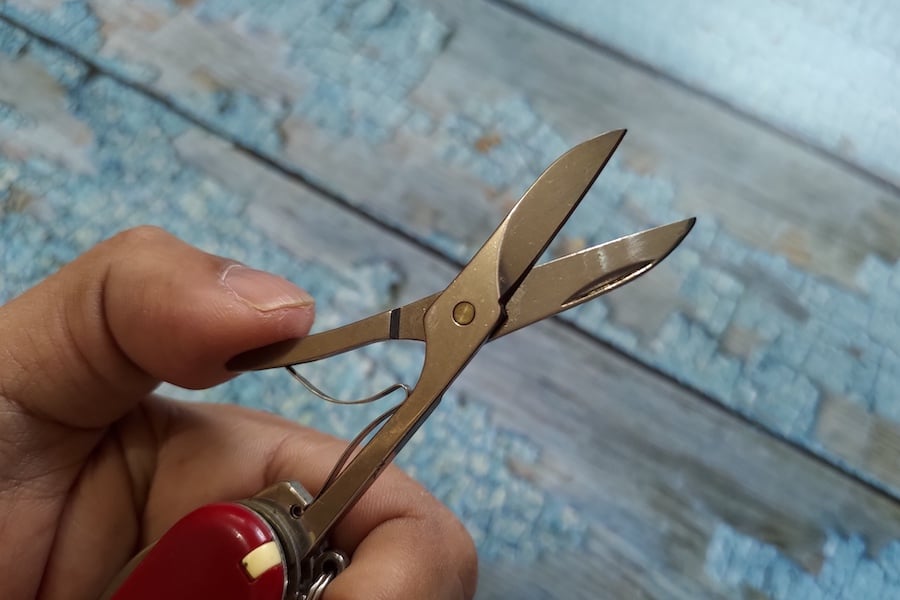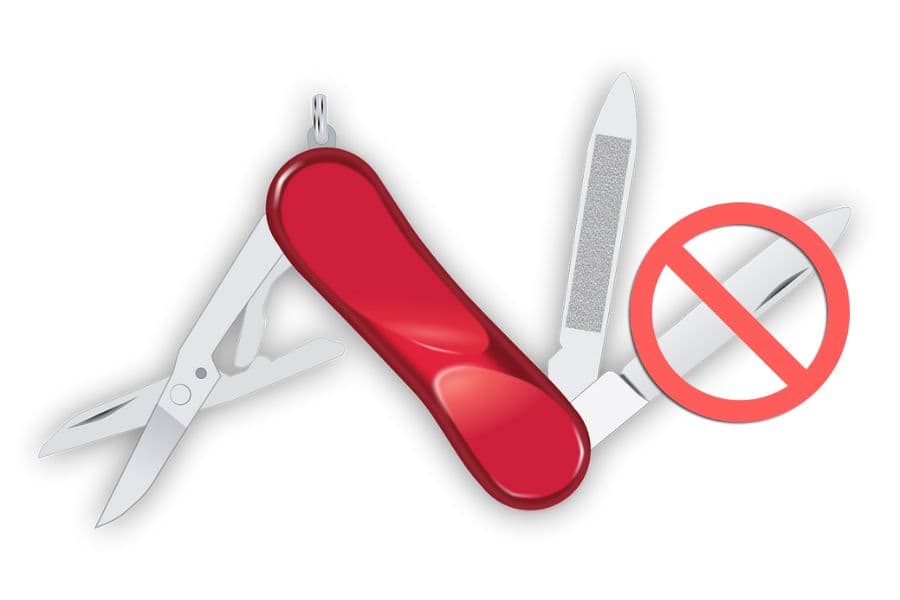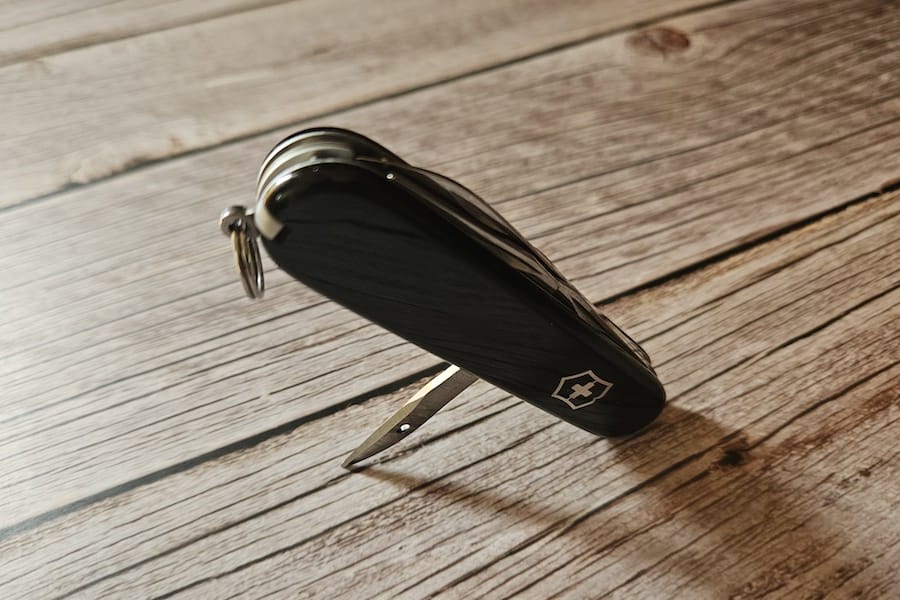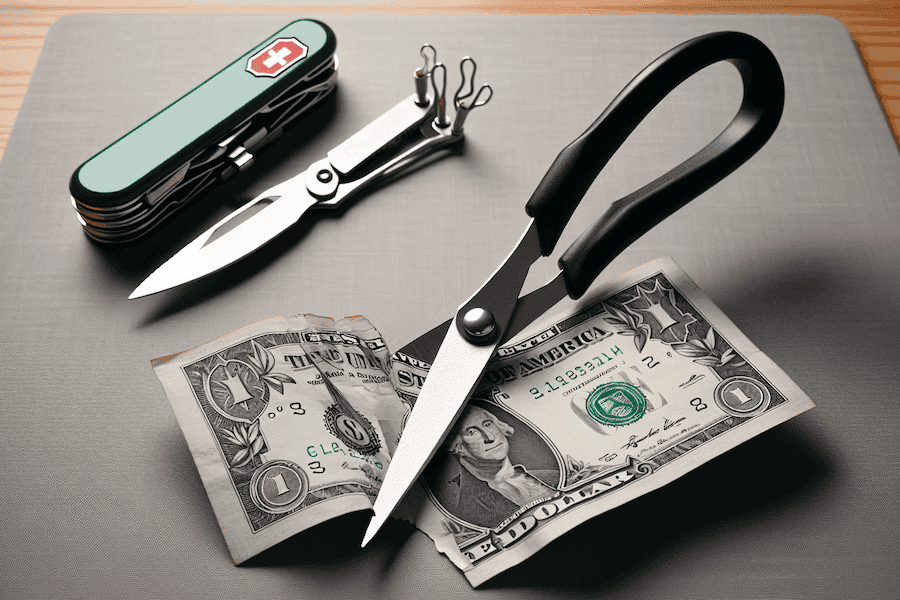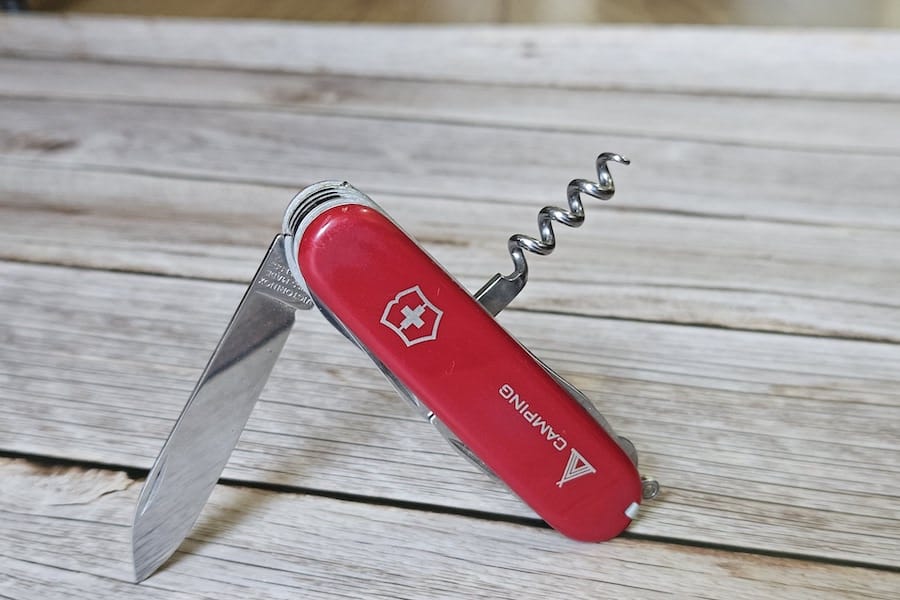I have often said that the pair of scissors in a Swiss Army Knife is the best I have seen in any pocket multi-tool. But they do get blunt with usage. Unfortunately, sharpening the scissors in a SAK is not as straightforward as sharpening the blade. After all, Victorinox does not provide any tool specifically meant for this purpose.
But of course, it can be done. Only that it requires a bit of skill and the proper tools. In this article, we will go through some of the best options we have to sharpen the Swiss Army Knife (SAK) scissors that include:
- Ceramic sharpening rod
- Diamond flat file
- Sandpaper
- Other Sharpening Tools
Why it is Difficult to Sharpen the SAK Scissors?
- The scissors are made of stainless steel. As such, it is difficult to sharpen with traditional sharpening methods applied to common scissors.
- The scissors are very small with a unique design, having narrow and delicate blades. This makes it difficult to sharpen them properly without damaging them.
- Because of the small size and very thin bevel of the edge, it is difficult to maintain the angle of sharpening.
- The two blades of the scissors are joined by a rivet. You cannot dismantle and separate them, and sharpen them individually.
Sharpening SAK Scissors with a Ceramic Rod
This is possibly the easiest way to sharpen the scissors in a Swiss Army Knife. And the ceramic rod in the Victorinox dual Knife Sharpener is best suited for it.
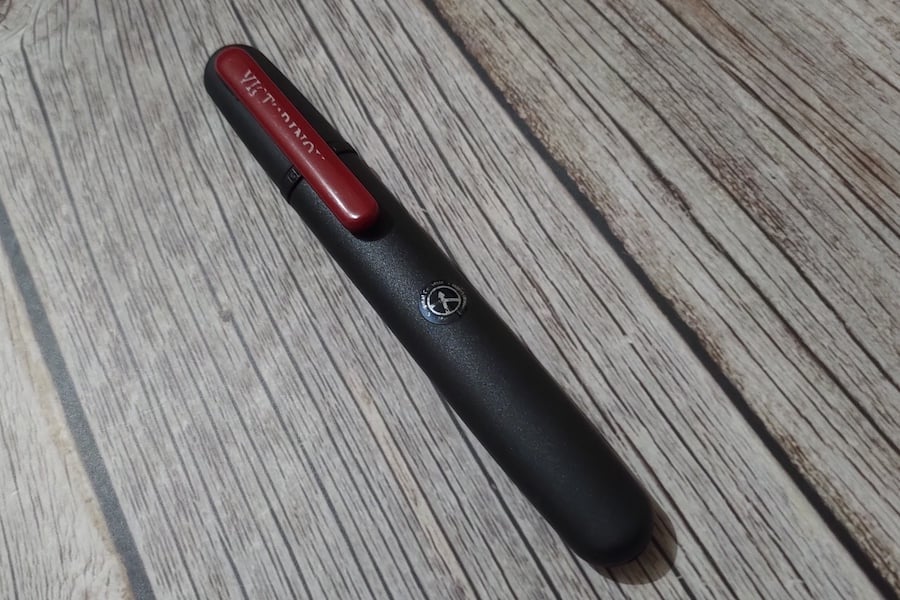
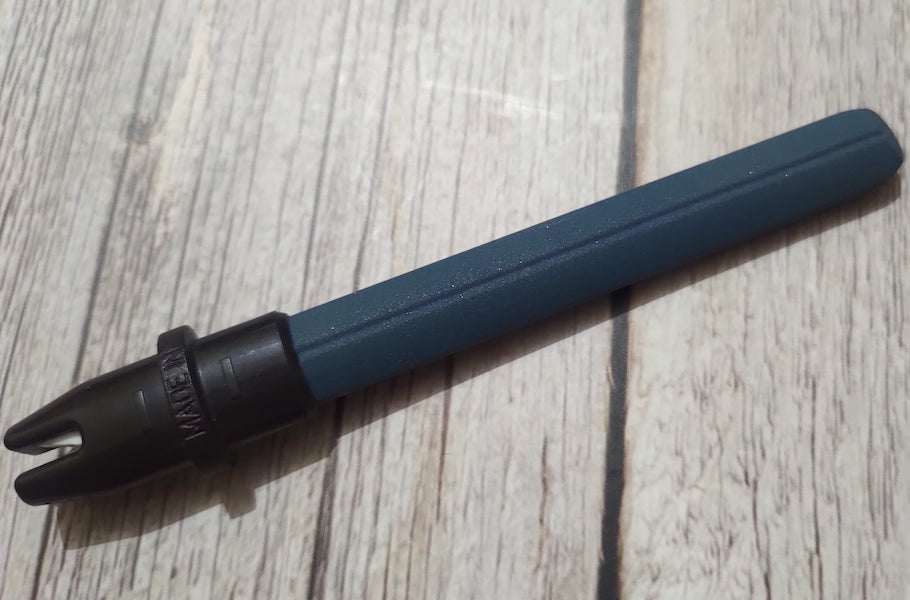
Do note that the Victorinox dual Knife Sharpener is primarily meant for sharpening the blade. But it can also be used to hone any tool with a sharp edge/point (scissors, awl, fishhook, etc.).
You would use the ceramic rod on the scissors similar to how would use it on a blade, keeping one point in mind – there is a flat chisel grind only on one side of each blade of the scissors.
Yes, the other side has no grind!
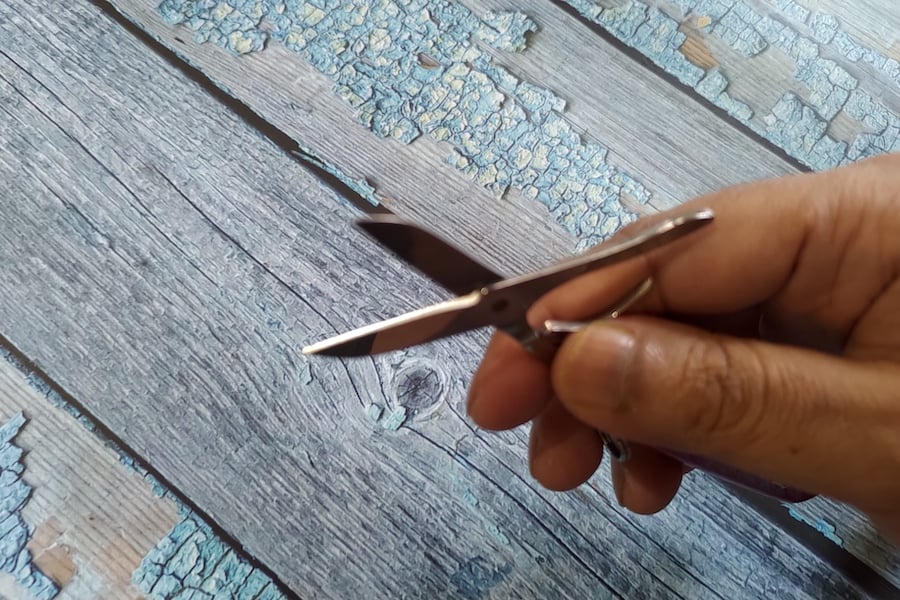
Of course, you can do this with other similar sharpening rods too. The only requirement is, you should be able to reach the area near the hinge. Make sure that the sharpening rod has a finer grit so that it doesn’t damage the blades.
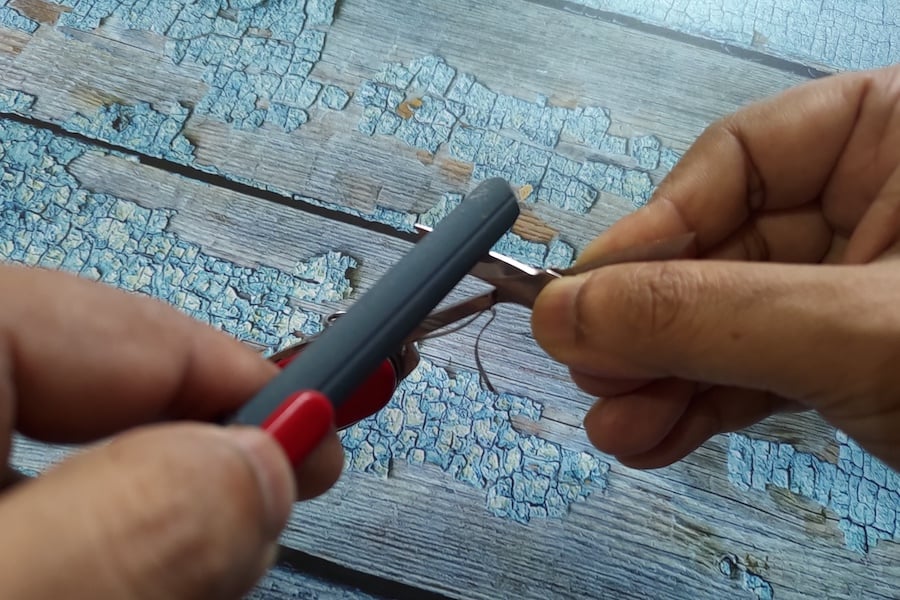
Steps to Sharpen the Scissors with the Ceramic Rod
- Hold the ceramic rod at the correct angle (20°) on the bevel of one of the blades.
- Maintaining the correct angle, sharpen just like you would any blade.
- Once you notice/feel that the process has raised a burr on the non-beveled side, stop.
- Use the ceramic rod on the flat side to remove the burr.
- Do the same process on the other blade.
- Open and shut the scissors to check the pass-through.
- Once both blades are done, wipe them clean with a cloth and test the sharpness on a piece of paper.
- Repeat the process until you get the desired sharpness.
While working the rod on the beveled side, you should be able to detect the burr forming on the other side as you drag your fingernail across the flat side toward the edge of the blade. I have used the ceramic rod on some of my older Swiss Army Knives to sharpen the scissors successfully.
You may have a Wenger SAK or a Victorinox Delemont SAK that has the scissors with the Wenger design with serrated edges. Then it cannot be sharpened with the ceramic rod. You can use sandpaper to sharpen such scissors (more on this later).
You can get the Victorinox Dual Knife Sharpener from this Amazon listing. This is also my go-to tool for sharpening the SAK blades. In fact, I have also written a detailed post on the various ways of sharpening the SAK blade.
Keep in mind that Swiss army knife scissors are too delicate to handle over-sharpening. To prevent any damage to the scissors, you should only sharpen them when necessary.
Sharpening SAK Scissors with the Victorinox Diamond Sharpener
The Diamond Sharpener is probably the best tool to sharpen the scissors provided you have the skills to use it properly. The process is more or less the same as you would follow with a ceramic rod. But it works better than the ceramic rod if can you can maintain the correct angle of sharpening.
I couldn’t get the Vic Diamond Sharpener from Amazon, as it was out of stock. But I found that the diamond file of my Leatherman Wave performs just as well and gives similar results.
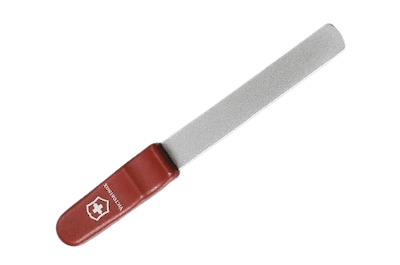
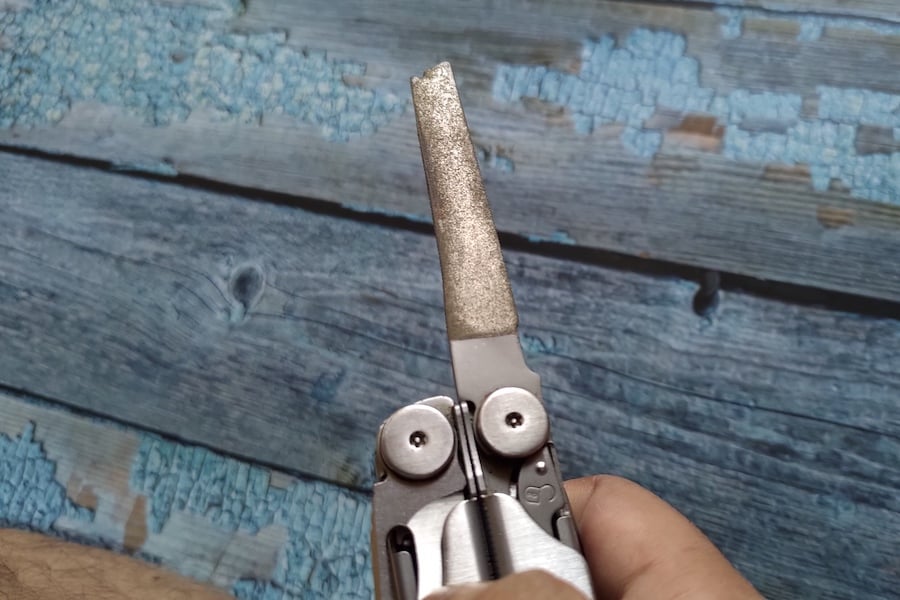
The trick, again, is to apply even pressure and maintain the correct angle throughout the sharpening process. Felix Immler shows an innovative way of doing this using the Victorinox Diamond sharpener in this video.
Sharpening SAK Scissors with Sandpaper
This is a technique that works sometimes on scissors to bring them back to acceptable sharpness. Does this work on Swiss Army Knife scissors? I haven’t tried it, but I have heard of mixed results from people who have. Also, the results may not be as precise and long-lasting as you would get with the other sharpening methods explained before.
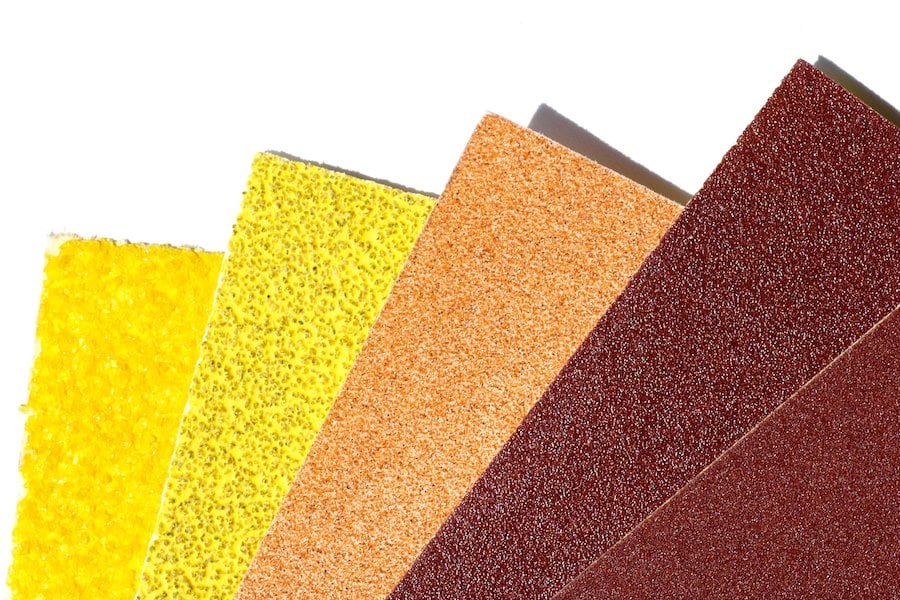
Keep in mind that sandpaper cannot fix burrs and nicks in the blades of the scissors. For such ‘deformations’, a ceramic rod or a diamond sharpener will work much better.
Use sandpaper when your scissors are not so dull and just need some touch-up.
The good thing is that you don’t need any special skills to do this. You just need to ‘cut’ sandpaper ????.
Steps to Sharpen the Scissors with Sandpaper
- Get a piece of sandpaper with fine grit, somewhere around #600 to #800 grit would be good.
- Fold the sandpaper in half, with the abrasive side facing outward.
- Now use the Swiss Army Knife scissors to cut very narrow strips off the sandpaper. Use long full strokes so that every part of the scissors’ blades touches the sandpaper.
- Cut about 9-10 narrow strips off the sandpaper.
- Test the sharpness by cutting a plain paper.
If you want to enhance the process, start with a coarse grit, say #800 first. After cutting 5-6 times, change to a finer grit like #1000 or #1200. Sandpapers are pretty cheap. The Dura–Gold Sandpapers listed on Amazon are pretty good for this purpose.
That’s all there is to know about it. Don’t expect extraordinary results, but your SAK scissors will probably cut better than before.
Alternatives to Sandpaper?
There are two alternatives to sandpaper that I have heard people use to sharpen scissors – Aluminium foil, and steel wool.
With Aluminium foil, you should fold it 3 to 4 times to make it a bit thicker and then follow the same process as you would with sandpaper. Similarly, you can use a steel wool soap pad from your kitchen and cut it with your SAK scissors.
Of the two materials, steel wool would be too rough for the scissors of the Swiss Army Knife. Aluminum foil on the other hand is not abrasive enough to effectively sharpen the scissors
Note that materials like sandpaper, Aluminum foil, or steel wool, will not actually sharpen the scissors by giving the blades a new clean edge. But they may temporarily improve the cutting ability of scissors by smoothing out any rough edges.
This is because when you cut the material, it brushes against the edge and smoothens it out by removing any rough sections and blemishes. This also removes any micro rust that can build on the cutting edge of the scissors’ blades. As a result, the scissors cut with less friction.
Other Tools for Sharpening SAK Scissors
Dedicated sharpening tool sets usually have specific tools for sharpening scissors too. If you have a lot of knives and other sharp objects that need regular sharpening, getting one of these tool sets may be a better option. Two of the best that I know of are the Spyderco Tri-Angle Sharpmaker and the Lansky Professional Sharpening System.
These tool sets are of course costly, but they do provide a complete solution for all your sharpening needs.
Both the Spyderco Tri-Angle Sharpmaker and the Lansky Professional Sharpening System are listed on Amazon.
Final Thoughts
Sharpening the scissors in a Swiss Army Knife is not as straightforward as sharpening the blade. But with some skill and the right tools, you can get the job done.
While it’s possible to use a ceramic rod or a diamond sharpener to sharpen the scissors, it’s important to do so carefully to avoid damaging the scissors. Additionally, using other methods such as sandpaper to sharpen the scissors may also improve the cutting performance temporarily.
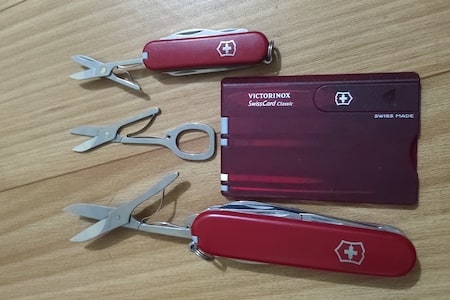
Note that cleaning your Swiss Army knife is an important part of SAK maintenance. Victorinox recommends cleaning the scissors after every use and occasionally oiling them to keep the scissors in good working condition for many many years.

